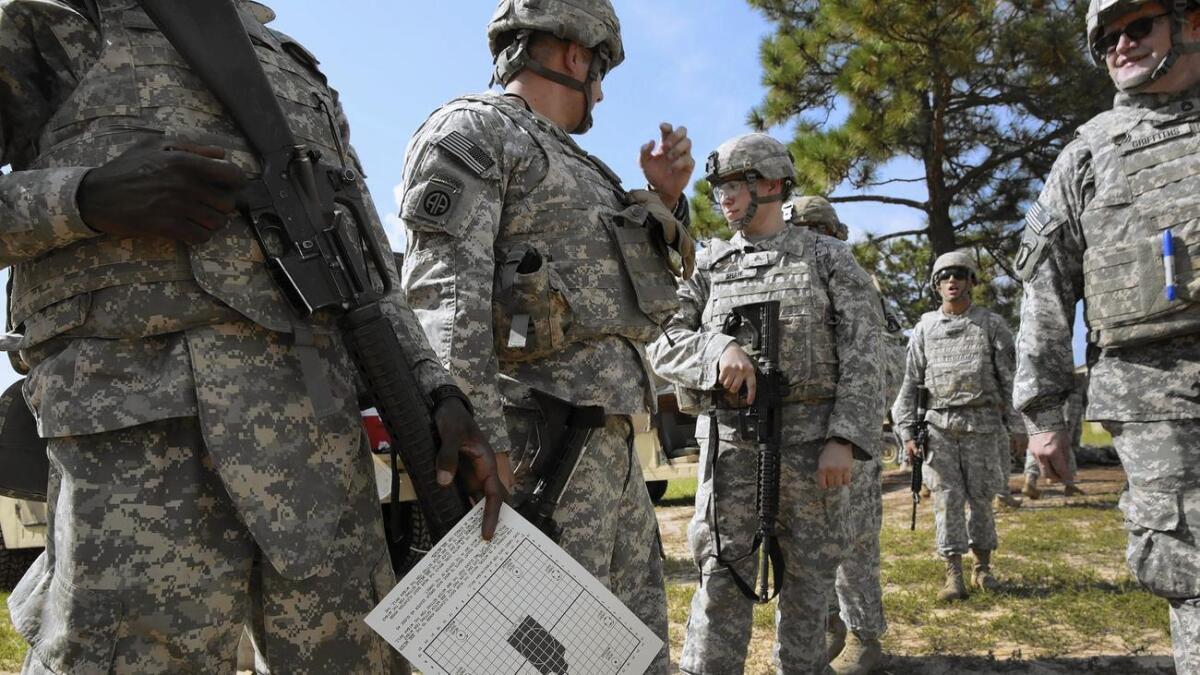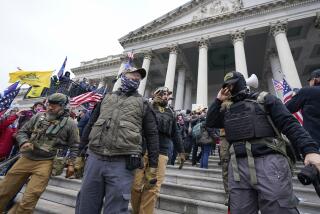Opinion: Confederate leaders were slavery’s soldiers. Strip their names from military bases

- Share via
It never made much sense to affix Braxton Bragg’s name to one of the U.S. Army’s major installations, Ft. Bragg in North Carolina.
Bragg, born in 1817 to North Carolina slaveowners, eventually owned his own plantation in Louisiana, which didn’t exactly set him apart at the time of American history. He also had a mixed history as a military leader.
But the biggest knock against him is that after some 20 years in the U.S. Army, including participating in the Second Seminole War (where he didn’t see action) and the Mexican-American War (where he did), Bragg became a major figure in the Confederate army during the Civil War.
So, yes, Ft. Bragg is named for an enemy combatant.
People occasionally have their attention riveted by something so important, it intrudes on their daily lives. Last week, that was Martin Gugino.
Army Secretary Ryan McCarthy told Politico on Monday that, after initially opposing the idea, he is now open to discussing renaming Ft. Bragg and nine other installations bearing the names of Confederate war heroes.
Good. Get discussing.
The Times Editorial Board joined the earlier nationwide calls to remove statues glorifying the leaders of the secession movement that brought the nation to ruinous war in 1861. They must be removed from publicly owned spaces — municipal parks, streets, etc. — not as an act of revisionism, but as a corrective to the whitewash of Confederate sins that began during Reconstruction and accelerated during the Jim Crow era.
(Interestingly, the city of Fort Bragg near Mendocino was also named for Bragg, but that came in 1857 and by a soldier who had served under Bragg before his acts of treason. There’s an interesting discussion to be had about whether the city should change its name, too.)
Most of the statues, such as the controversial Robert E. Lee behemoth in Richmond, Va., that is now the subject of a court battle, were erected in campaigns to rehabilitate the image of the Confederacy, and as an act of intimidation against African Americans demanding equal treatment. The memorials tied into the romanticized “Lost Cause” narrative that secession and the Civil War were about states’ rights in the face of “Northern aggression,” and in defense of Southern honor and way of life.
Never mind that the Southern way of life was built on a race-driven system of slavery built on a belief in white supremacy.
“For an organization designed to win wars to train for them at installations named for those who led a losing force is sufficiently peculiar, but when we consider the cause for which these officers fought, we begin to penetrate the confusion of Civil War memory,” retired U.S. Army Gen. David H. Petraeus wrote for the Atlantic on Monday. “The irony of training at bases named for those who took up arms against the United States, and for the right to enslave others, is inescapable to anyone paying attention.”
“Irony” is an understatement. In taking up arms against the U.S., those generals and soldiers committed treason. It makes no sense to have their names affixed to military bases now.
And to continue to honor those who sought to destroy the union in defense of such an abominable institution as slavery sends a signal to African Americans that they still don’t count as full members of a white-dominated society.
You can’t separate race from Trump’s attacks on ‘thugs’ in Minneapolis
If the past few weeks have taught the country anything, it’s that we need to reassess how we do many things, and not just policing. This nation has always been a bundle of paradoxes, and our perception of our own history reflects that. Europeans arrived as an invading force and seized land from people already living here. In the name of individual liberty, the Founding Fathers created a nation that enslaved Africans and their descendants and amassed fortunes through their back-breaking labor.
Slavery still stains the nation in ways both obvious and subtle, and white Americans are confronting that hard reality in the aftermath of George Floyd’s death in policy custody in Minneapolis.
There’s irony at play there, too. Colin Kaepernick, then the quarterback for the San Francisco 49ers, brought police brutality against African Americans to the fore of national discussion in 2016 by symbolically taking a knee during the singing of the national anthem at the start of National Football League games. Nearly four years later, Floyd dies under the knee of a white police officer.
The persistence of racism, both individual and institutional, in American society betrays all that we think is good about our country. It makes a mockery of the notion that all lives are created equal, and that we are born with “certain unalienable rights, that among these are life, liberty and the pursuit of happiness.”
And we seem to go through cycles of awareness. Urban unrest in the 1960s forced the United States to confront profound inequities. Consciousness was raised, commissions were convened and reports were issued — and some gains were made. Yet, indefensible inequities remain.
If there is any optimism to be found, it is in signs that American attitudes are changing. A new Washington Post-Schar School poll found that a significant majority of Americans — 69% — believe that Floyd’s death signaled a broader problem with how police operate, up from 43% who said so in the aftermath of the killings that preceded protests in Ferguson, Mo., six years ago.
That’s a tidal change, and for the better. But it needs to increase further while translating into action, and positive, measurable and permanent changes.
An easy step is removing Confederate statues from public spaces and stripping the names of slavery’s soldiers from U.S. military bases and public buildings. We can’t fully confront the present without understanding the bald truth of how we got here, and continuing to honor and hold up as heroes men who committed treason in defense of slavery doesn’t help.
More to Read
A cure for the common opinion
Get thought-provoking perspectives with our weekly newsletter.
You may occasionally receive promotional content from the Los Angeles Times.












